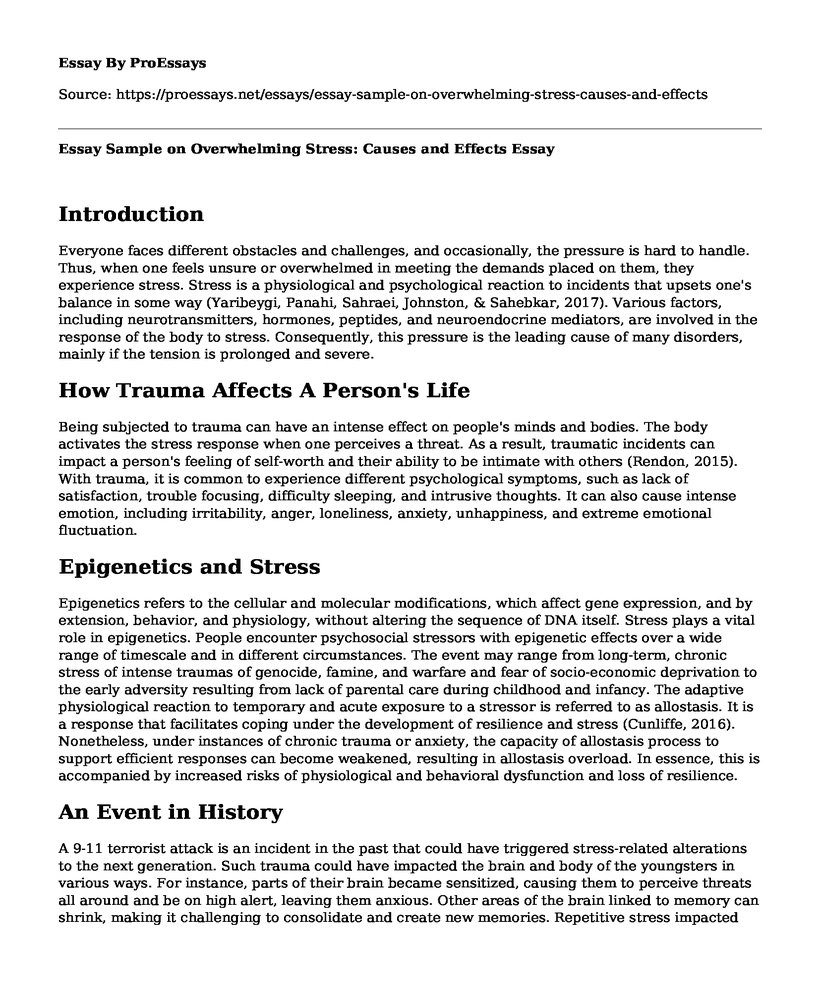Introduction
Everyone faces different obstacles and challenges, and occasionally, the pressure is hard to handle. Thus, when one feels unsure or overwhelmed in meeting the demands placed on them, they experience stress. Stress is a physiological and psychological reaction to incidents that upsets one's balance in some way (Yaribeygi, Panahi, Sahraei, Johnston, & Sahebkar, 2017). Various factors, including neurotransmitters, hormones, peptides, and neuroendocrine mediators, are involved in the response of the body to stress. Consequently, this pressure is the leading cause of many disorders, mainly if the tension is prolonged and severe.
How Trauma Affects A Person's Life
Being subjected to trauma can have an intense effect on people's minds and bodies. The body activates the stress response when one perceives a threat. As a result, traumatic incidents can impact a person's feeling of self-worth and their ability to be intimate with others (Rendon, 2015). With trauma, it is common to experience different psychological symptoms, such as lack of satisfaction, trouble focusing, difficulty sleeping, and intrusive thoughts. It can also cause intense emotion, including irritability, anger, loneliness, anxiety, unhappiness, and extreme emotional fluctuation.
Epigenetics and Stress
Epigenetics refers to the cellular and molecular modifications, which affect gene expression, and by extension, behavior, and physiology, without altering the sequence of DNA itself. Stress plays a vital role in epigenetics. People encounter psychosocial stressors with epigenetic effects over a wide range of timescale and in different circumstances. The event may range from long-term, chronic stress of intense traumas of genocide, famine, and warfare and fear of socio-economic deprivation to the early adversity resulting from lack of parental care during childhood and infancy. The adaptive physiological reaction to temporary and acute exposure to a stressor is referred to as allostasis. It is a response that facilitates coping under the development of resilience and stress (Cunliffe, 2016). Nonetheless, under instances of chronic trauma or anxiety, the capacity of allostasis process to support efficient responses can become weakened, resulting in allostasis overload. In essence, this is accompanied by increased risks of physiological and behavioral dysfunction and loss of resilience.
An Event in History
A 9-11 terrorist attack is an incident in the past that could have triggered stress-related alterations to the next generation. Such trauma could have impacted the brain and body of the youngsters in various ways. For instance, parts of their brain became sensitized, causing them to perceive threats all around and be on high alert, leaving them anxious. Other areas of the brain linked to memory can shrink, making it challenging to consolidate and create new memories. Repetitive stress impacted the development of various health issues, such as hypertension, obesity, and diabetes (Rendon, 2015). It could have also changed the ability to control food intake, the experience of chronic pain, brought on anxiety disorder and affected moods.
Children Affected with Trauma their Parents Experienced
It might be helpful to understand how youngsters will be impacted by the distress their parents suffered. The reason for this is that young children are the most susceptible to vicarious trauma and secondary traumatic stress. Often, key attachment figures and caregivers in the life of a child cannot respond to the requirements of their young ones if they are debilitated by stress (Harris, 2018). Consequently, this becomes catastrophic to the emotional development of youngsters as their brain structure organization relies on a responsive and attentive parent.
Recent Happenings that Could Generate Comparable Effects in Future Generations
War experiences and acts of terrorism are events going on in the world right now that could generate stress-related disorder in future generations. The mentioned incidents lead to anger, reduced concentration, loss of interest in usual activities, nightmares and sleep disturbances, separation anxiety, and development of new fears.
Conclusion
Stress is an event in life with possibly long-lasting impacts on behavior and health. The anxiety leads to many disorders, mainly if the trauma is prolonged and severe. Thus, there is a need for the medical community to have a greater appreciation for the vital roles that stress may play in different ailments and then treat the patients accordingly. They may achieve this through therapeutic, non-pharmacological, and pharmacological interventions.
References
Cunliffe, V. T. (2016). The epigenetic impacts of social stress: how does social adversity become biologically embedded?. Epigenomics, 8(12), 1653-1669.
Harris, N. B. (2018). The deepest well: healing the long-term effects of childhood adversity. Boston: Houghton Mifflin Harcourt.
Rendon, J. (2015). Upside: the new science of post-traumatic growth. New York, NY: Touchstone.
Yaribeygi, H., Panahi, Y., Sahraei, H., Johnston, T. P., & Sahebkar, A. (2017). The impact of stress on body function: A review. EXCLI journal, 16, 1057-1072.
Cite this page
Essay Sample on Overwhelming Stress: Causes and Effects. (2023, Feb 12). Retrieved from https://proessays.net/essays/essay-sample-on-overwhelming-stress-causes-and-effects
If you are the original author of this essay and no longer wish to have it published on the ProEssays website, please click below to request its removal:
- Effect of Music Therapy on the Cognitive Functions, Anxiety, and Depressive Symptoms
- Research Paper on Music Therapy and Effects of Music on Psychological and Mental Health
- Why People Behave the Way They Do? Essay Example
- A Comprehensive Summary of My Dietary Intake: Tracking Progress Paper Example
- Essay Sample on Early Intervention Needed for Kids with Autism, Mental Illness
- Annotated Bibliography: Organizational Culture, Burnout, Bullying, and Nurse Turnover Intention
- Essay Example on Loneliness: An Intense Feeling of Sadness and Isolation







